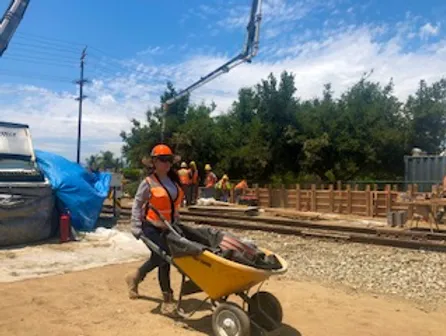With over 5,000 sf of laboratory space, they house one of the largest construction materials testing laboratories in California. The laboratory has a sample receiving area consisting of 1000 sf and a sample storage area of 1500 sf. It is equipped with a moist curing room, a fume hood, compressed air, de-ionized water, and other general utilities required for a certified facility.
Mobile Laboratory
TQF owns self-sufficient and customizable mobile laboratories that are available to be mobilized to a job site in hours and arrive at the project site ready to perform testing within minutes.
Our mobile labs are fully equipped with internal power and water and are capable of being moved to various locations throughout the duration of a project to maximize their efficiency.
With the large amount of construction-related, time-sensitive work that TQF performs, our laboratories understand the importance of effectively accomplishing efficient turnaround for testing.
Concrete testing
Masonry Testing
Aggregate Testing
Bituminous Pavement Testing
Structural & Reinforcing Steel Testing
Fireproofing Testing
Soil Testing for Geotechnical Engineering Applications
Moist cabinets, Moist Rooms, and Water Storage Tanks Used In Hydraulic Cements and Concrete
Slump of Hydraulic Cement
Air Content by Volumetric Method

Sampling and Testing Masonry Units
Preconstruction and Construction Evaluation of Mortars – Consistency by Cone
Compressive Strength of Masonry Units, Related
Capping Concrete Masonry Units, Related Unites, and Masonry Prisms for Compressing Testing
Dry Preparation of Disbursed Soil
Laboratory Determination of Moisture Content
Description and Identification of Sols
Bulk Specific Gravity of Compacted Hot Mix Asphalt Using Saturated Surface – DrySpecimens (Cores)
Thickness and Density of Spray Fire-Resistive Materiais(SFRM) applied to Structural Memebers
Our vision is to build a world where diversity is ingrained in the foundation of the future. Always looking forward - we invest in the future we want for our company, our clients, our environment, and the communities we serve. We stay ahead of trends to position ourselves at the leading edge of a constantly changing industry. Our success doesn't come from one person or one department—it comes from all of us working together toward a shared vision: a better world for everyone involved in our business.
To apply for a job with The Quality Firm, please send a cover letter together with your resume.